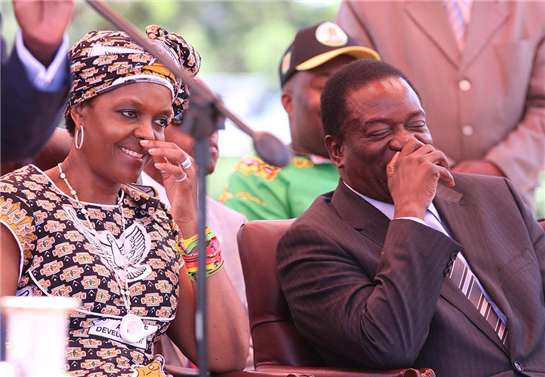Grace betrays Mugabe by surrendering his memorabilia to Mnangagwa

Former First lady Grace Mugabe and President Emmerson Mnangagwa
Staff Reporter
In an unexpected gesture that has stirred the political waters of Zimbabwe, Grace Mugabe, the widow of the late President Robert Mugabe, has extended an olive branch to President Emmerson Mnangagwa by offering her late husband’s memorabilia. This act is seen by many as a stark departure from the late Mugabe’s known wishes, as he had made it clear that he wanted no association with Mnangagwa after his ousting in a military coup.
Grace Mugabe’s poignant words resonate with a call for historical integrity: “For the future generations, we have an opportunity to come and understand where we came from and where we are now and where we are hoping to go in the future…if we don’t correct the distorted history in this manner they would not know exactly who they are.”
This statement underscores her newfound commitment to preserving her husband’s legacy, despite previous tensions.
The backdrop of this narrative is a country still grappling with the legacy of its former leader. Robert Mugabe, once a liberation hero, saw his four-decade rule end abruptly in 2017 when his former ally Mnangagwa took power.
The refusal to bury Mugabe at the Heroes Acre—a national monument and burial ground for those deemed national heroes—was a clear snub to Mnangagwa and his government.
Yet, in a turn of events, Grace Mugabe, alongside family members including Innocent Matibiri, has decided to reassess their stance. “Acknowledging her husband’s significant role in shaping Zimbabwe and the continent,” Grace expressed her skepticism about her own contributions but recognized the importance of preserving his memory.
The decision to hand over President Mugabe’s belongings, including personal artifacts and documents, to Mnangagwa is a move laden with symbolism. It suggests a potential softening of the divide between the Mugabe family and the current administration, opening a door to reconciliation.
This development has not only political implications but also cultural ones, as it involves the Museum of African Liberation, an institution dedicated to presenting an accurate history of the continent’s struggle for freedom. By contributing to this museum, Grace Mugabe is ensuring that her husband’s role in the liberation of Zimbabwe is remembered and understood by future generations.
The story of Zimbabwe is complex, and the Mugabes have been central to it. With this act of handing over memorabilia, Grace Mugabe is writing a new chapter, one that she hopes will provide a fuller picture of her husband’s life and work. It’s a chapter that invites reflection on the nature of legacy, memory, and the paths toward healing historical wounds.






